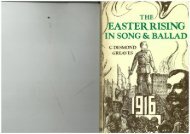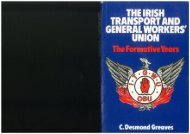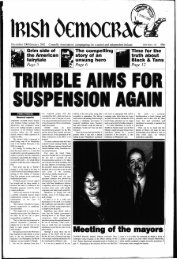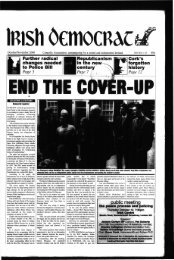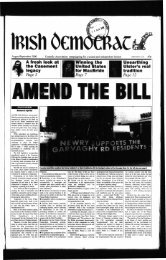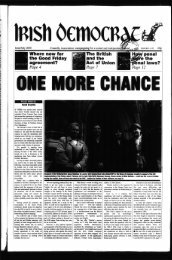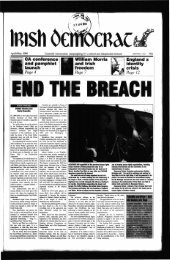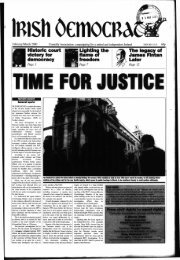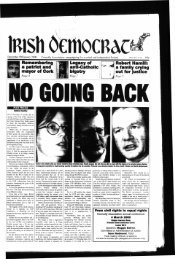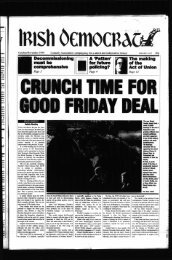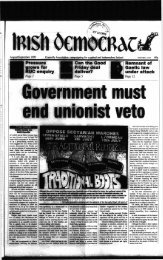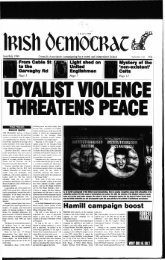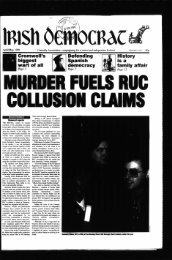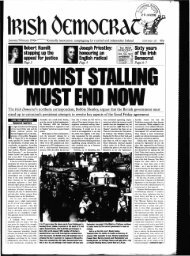Create successful ePaper yourself
Turn your PDF publications into a flip-book with our unique Google optimized e-Paper software.
The Canadian government is<br />
planning a theme park on the<br />
mass graves of the Famine dead<br />
Winter of Scottish discontent:<br />
Scotland United<br />
campaigning agefldj^^r^<br />
Michael O'Riordan writes a belated<br />
obituary for the forgotten poet of<br />
the Spanish Civil War<br />
11111111111111111111111111111<br />
i i i i i i i i i i i i 111 if i U,UJJJ<br />
i<br />
<strong>August</strong> <strong>1992</strong><br />
i •! -> .ji. i i ii i. i : H i ' i • .11 ii i<br />
• Connolly Association: campaigning for a united and independent Ireland • Price 40p<br />
IS939|l5llf9RSEHH[<br />
REPUBLICANS<br />
<strong>Democrat</strong> reporter there must be a rapproche-<br />
"If we are to ever resolve<br />
the situation in Ireland ...<br />
7 ment with the Protestant<br />
IF REPUBLICANS] are not community in the North," he<br />
ready to understand the wrote in The Guardian<br />
fears and aspirations of the newspaper.<br />
Protestant community, they Even after British<br />
will consign the people of withdrawal, which he said<br />
Ireland to endless war, Derry remained a prerequisite for<br />
Sinn F6in leader Mitchell peace, the north-east of<br />
McLaughlin warned last Ireland would still be ocmonth.<br />
cupied by almost one million<br />
people "whose whole his- he alleged that republicans<br />
tory, aspirations, culture and had been partly to blame for<br />
sense of stability have been the disappearance of a<br />
formed, nurtured and rein- vibrant, radical non-conforforced<br />
within a British pism from the Protestant<br />
political, intellectual and community,<br />
emotional environment". 1 Since partition,<br />
He admitted a reciprocal republicans had rejected the<br />
desire for peace and under- dissenting Protestant voice<br />
standing would be needed because of their own fear of<br />
from the Protestant com- the Catholic hierarchy, he<br />
m unity.<br />
charged.<br />
But most controversially, (• Republicans had to face<br />
the unpalatable truth that This was neither possible<br />
"many IRA activities from nor acceptable, he warned,<br />
the northern Protestant "We must convince them of<br />
perspective are perceived to the lightness of our cause<br />
be sectarian".<br />
and of the benefits accruing<br />
He said that there had al- to them from advocacy of our<br />
ways been an element within cause," he said,<br />
the republican movement He said republicans had<br />
"who secretly believe that to choose between paying lip<br />
the Protestant population service to anti-sectarianism<br />
could be coerced into accept- or actively seeking to connect<br />
ing <strong>Irish</strong> unity and with Protestantism at every<br />
independence".<br />
level.<br />
/<br />
THE TWELFTH<br />
Martin Moriarty<br />
THE bands<br />
played The Sash<br />
while marchers<br />
chanted "Up<br />
the UFF" and<br />
"Five-nil" as the Orange<br />
Order last month took<br />
one of its triumphalist<br />
Twelfth of July parades<br />
past the Belfast bookies'<br />
shop where loyalist<br />
paramilitaries murdered<br />
five Catholic civilians in<br />
February.<br />
So much for the<br />
pledges of the march organisers,<br />
who cynically<br />
promised the RUC that<br />
the bands would drop<br />
their sectarian song<br />
• Turn to page 2<br />
l i i i
HEADLINES<br />
E D I T O R I A L<br />
The talks and the new <strong>Irish</strong> treaty<br />
11<br />
BRITAIN created Northern Ireland and as we<br />
continually proclaim is solely responsible for<br />
the economic and political life of the colony. A<br />
colony we might add that has never known<br />
peace. Shortly after it was carved from the rest<br />
of Ireland by the 1920 Government of Ireland Act, the<br />
Special Powers Act was brought into being which gave<br />
extra powers to the police to act outside normal law to<br />
put down the ever-rising dissent of the nationalist community<br />
trapped in a zone cut out of Ireland for supporters<br />
of British rule. The nationalists, cut off from<br />
their own people, were bound to strive for freedom<br />
while the unionists were, with the help of the British parliament,<br />
bound to oppose any change in the British arrangement<br />
which gave them a veto on any change. We<br />
repeat it is Britain's creation and Britain's dilemma. And<br />
there is little doubt now that they are looking for a solution<br />
to their dilemma.<br />
As we go to press talks about the political future of<br />
Ireland have concluded part of the second stage of<br />
negotiations leading up what the British government<br />
calls a new British-<strong>Irish</strong> Treaty. A previous treaty signed<br />
by the <strong>Irish</strong> under the threat of 'immediate and terrible<br />
war' resulted in the partition of Ireland and the creation<br />
of Northern Ireland from six of the nine counties of<br />
Ulster.<br />
The new Secretary of State for Northern Ireland,<br />
equivalent to the Governor-General of Hong Kong, has<br />
continued the search for the resolution of Britain's dilemma<br />
in Ireland started by his predecessor Peter Brooke.<br />
The idea was for all the political parties in Northern<br />
Ireland, excluding Sinn F6in, to agree to talk. Having<br />
agreed to talk the various parties were informed what<br />
was in it for them. Talk of a restoration of the Stormont<br />
parliament was included with the promise of office for<br />
those that wanted iL The SDLP were seduced but<br />
demanded a six-strong commission to oversee the new<br />
Tragic epic of<br />
<strong>Irish</strong> history<br />
CORK<br />
Jim Savage<br />
VISITORS to Cork this<br />
summer should make<br />
sure they spend some<br />
time at the French Armada Exhibition<br />
at Bantry House in<br />
West Cork.<br />
The centrepiece of the exhibition<br />
is a one-to-six scale<br />
model of the frigate Surveillante,<br />
one of 10 vesels lost in<br />
the attempted French invasion<br />
at the end of December 1796.<br />
The French fleet left Brest<br />
on 15 December 17%, under<br />
General Hoche, with Grouchy<br />
second-in-command and the<br />
United <strong>Irish</strong> leader Wolfe Tone<br />
chef de brigade on board the 80-<br />
gun flagship Indomitable<br />
commanded by a Canadian<br />
named Bedout.<br />
Tore had arrived in France<br />
10 months earlier with the express<br />
intention of persuading<br />
the French to raise an expeditionary<br />
force.<br />
The would-be invaders<br />
were dogged by now-famous<br />
ill-luck.<br />
Hoche's ship, the<br />
Fraternity never reached<br />
Ireland, cut off from the rest of<br />
the fleet in fog, but 35 of the 43<br />
that had set out eventually<br />
reached Bantry Bay on 20<br />
December, the appointed rendezvous<br />
in the event of<br />
separation, not the intended<br />
landing point.<br />
The order came to cruise for<br />
five days, to the enormous<br />
frustration of Tone, who wrote<br />
in his journal:<br />
"There cannot be imagined<br />
a situation more provokingly<br />
tantalising than mine at mis<br />
moment; within view, almost<br />
within reach of my native land,<br />
and uncertain I shall ever set<br />
foot on it."<br />
In the teeth of a fierce gale,<br />
it proved impossible for the 15<br />
ships that had got inside the<br />
bay to attempt a landing, bat<br />
Grouchy determined to attempt<br />
to land with the<br />
remaining 20 outside the bay<br />
only to be overruled by Admiral<br />
Bouvet.<br />
To Tone's great rage, the<br />
vessels cut their cables and<br />
stood out to sea. Only 10 survived.<br />
The Surveillante was scuttled<br />
off Whiddy Island and<br />
remained undisturbed for almost<br />
200 years until it was<br />
discovered in 1982, when it<br />
was declared an <strong>Irish</strong> national<br />
monument.<br />
In the scale model, Tone is<br />
shown in his cabin, and extracts<br />
from his journal help to<br />
bring the story alive to visitors.<br />
The exhibition centre is educational<br />
and entertaining, and a<br />
visit is an unforgettable experience.<br />
i.t<br />
arrangement with representatives of the London and<br />
Dublin governments and the European Commission.<br />
Their proposal was leaked' and dismissed by the<br />
British. Talk of a Bill of Rights for Northern Ireland was<br />
floated, but there was no substance and no form of<br />
words. The Unionists — both parties — were a little<br />
more wary of losing their veto. They were promised that<br />
the Anglo-<strong>Irish</strong> agreement would be phased ouL This is<br />
what they wanted. It would in turn be replaced by a<br />
British treaty which would ensure that there would be<br />
no change in the relationship between these two islands.<br />
The purpose of die exercise is to tie the <strong>Irish</strong> government<br />
into Britain's effort to control dissent in the colony.<br />
To reinforce this a new regiment descended front the B-<br />
Specials and called the Royal <strong>Irish</strong> Regiment would be<br />
formed to protect royalists (or should it be loyalists?).<br />
Certainly the royalists will be loyal as long as the British<br />
taxpayer continues to keep them in the manner to which<br />
they have become accustomed.<br />
So who is being fooled? The British promise change<br />
in the political makeup of Northern Ireland while assuring<br />
the unionists that there will be no change for them.<br />
There is no talk'of removing the British troops from<br />
Ireland. There is no talk of disarming the legal unionist<br />
paramilitary groups. No talk of removing the border<br />
that divides the <strong>Irish</strong> people and encourages sectarianism.<br />
No talk of amending the 1920 Government of<br />
Ireland Act that divided Ireland into <strong>Irish</strong> and British<br />
zones.<br />
And what of the <strong>Irish</strong> government? The previous<br />
treaty between the governments of these two islands left<br />
Ireland with a bad deaL Will the <strong>Irish</strong> government get involved<br />
in a series of negotiations that will let Britain off<br />
the hook for the nearly 3,0Q0 people killed in its colony?<br />
Will they be so naieve as to even think that the country<br />
that ruled half the world will give freedom to Ireland<br />
without gaining something better in return? Let the <strong>Irish</strong><br />
• From page 1<br />
sheets and perform hymn<br />
tunes as they passed the scene<br />
of the massacre.<br />
The RUC had predictably<br />
refused to re-route the march.<br />
The chants and tunes were<br />
gestures typical of the<br />
grotesque bigotry that always<br />
attends Orangeism's celebrations<br />
of the anniversary of the<br />
Battle of the Boyne. There is a<br />
long tradition of bands stopping<br />
outside particularly sensitive<br />
spots for interludes of<br />
especially loud drumming accompanied<br />
by bigoted chants<br />
and gestures.<br />
Events outside the bookies<br />
were nothing to do with rogue<br />
elements on the march: they<br />
were what the marches are essentially<br />
all about.<br />
The Orange Order were<br />
swift to excuse the marchers.<br />
Writing in The <strong>Irish</strong> Times last<br />
Catholic killed on eve of<br />
Twelfth celebrations<br />
LOYALISTS<br />
<strong>Democrat</strong> reporter<br />
A<br />
RETIRED<br />
Catholic<br />
schoolteacher who had<br />
just celebrated his 51st<br />
birthday was shot dead in a<br />
nakedly sectarian attack by<br />
die Ulster Freedom Fighters,<br />
the UDA's nom de guerre, on<br />
the eve of the triumphalist<br />
celebrations of die Twelfth of<br />
July last month.<br />
Cyril Murray was murdered<br />
when three masked<br />
gunmen burst into his home<br />
off the Newtownards Road in<br />
die predominantly Protestant<br />
area of east Belfast and shot<br />
him dead outside his<br />
bedroom door.<br />
Friends, neighbours and<br />
colleagues<br />
dismissed UFF claims that Mr<br />
Murray had any connection<br />
with die IRA last month, an<br />
allegation the UFF hate frequently<br />
made in an attempt to<br />
disguise the sectarian nature<br />
of many of their attacks.<br />
According to RUC statistics,<br />
Mr Murray last month<br />
became the 2,995th fatal victim<br />
of political violence since<br />
die current crisis erupted iit<br />
tun<br />
17U7.<br />
An east Belfast man was<br />
charged with his murder<br />
within a week of the attack.<br />
Unemployed 29-year-old<br />
William Watson was also<br />
charged with possession of a<br />
sawn-off shotgun, and conspiracy<br />
to murder with others<br />
not before the court another<br />
nun who UveddosstoMr<br />
government beware that they do not become the fall<br />
guys in a political set-up over which they have no control.<br />
It has happened before.<br />
We can safety forecast that any return to a Stormont<br />
government would be disastrous. It would entrench the<br />
unionists even more info the ghetto mentality. The nettle<br />
must be grasped. Britain did it in Rhodesia when it<br />
withdrew much to the anger of the whites. Britain is<br />
withdrawing from Hong Kong against the wishes of the<br />
people there. So too it can withdraw from Northern<br />
Ireland, with honour, and gain the admiration of the<br />
will leave the <strong>Irish</strong> people in the Six Counties living<br />
under a patronising imperialism backed up by 30,000<br />
armed personnel. The <strong>Irish</strong> do not take kindly to bring<br />
colonised, <strong>Irish</strong> history at least proves that The <strong>Irish</strong> and<br />
British governments would be unwise to ignore history.<br />
PM<br />
MONTHLY NEWSPAPER OF THE<br />
CONNOLLY ASSOCIATION<br />
Founded 1939 Vol 47; no 8<br />
EDITOR: Martin Moriarty<br />
EDITORIAL BOARD: Gerard Curran, Conor Foley, Martin<br />
Moriarty, Peter Mulligan<br />
TYPESET AND DESIGNED: Connolly Publications<br />
PU 3LISHED BY: Connolly Publications Ltd, 244-246 Gray's ton<br />
Road, London WC1X 8JR. Tel: 071-833 3022<br />
PRINTEP BY: Ripley Printers (TU) Ltd, Nottingham Road,<br />
Ripley, Derbyshire. Tel: 0773-731641<br />
1939-1980 now available on microfilm<br />
month, Clifford Smyth, convenor<br />
of the Grand Orange<br />
Lodge of Ireland education<br />
committee, argued that the real<br />
cause of the trouble was a<br />
sighting of the tricolour among<br />
protesters outside the bookies.<br />
The <strong>Irish</strong> national flag was<br />
"calculated to draw a knee-jerk<br />
reaction from Orange<br />
brethren" since it was "identified<br />
in the minds of every<br />
single one of the hundreds on<br />
parade not just with the stab in<br />
the back against Britain and<br />
the Empire at Easter 1916, but<br />
with the gepocidal IRA terrorist<br />
campaign", Smyth<br />
argued.<br />
He refused to accept that it<br />
wassick displays of hatred that<br />
were at the root of the trouble.<br />
He argued instead that<br />
nationalists were trying to suppress<br />
"our very presence as a<br />
community of pebble<br />
proclaiming our human rights<br />
to be who we are—Britishand<br />
Protestant in Ireland".<br />
Our human rights to be<br />
who we are? Every Orange<br />
Order demonstration in the<br />
Counties last month passed a<br />
resoli<br />
and loyalty" to the Queen,<br />
which declared that the Order<br />
remained a steadfast supporter<br />
of the constitutional<br />
monarchy. Another announced<br />
that "any<br />
involvement of [the <strong>Irish</strong>]<br />
Republic in the government of<br />
this part of the United<br />
Kingdom will be resisted as<br />
unwaranted interference ili the<br />
affairs of another country."<br />
Not much about Protestant —<br />
as opposed to unionist—identity<br />
in that lot.<br />
The truth is that protests<br />
about the sectarian nature of<br />
the Twelfth parades have<br />
nothing to do with the i<br />
presskm of thehuman j<br />
Northern Protestants.<br />
Complaints about Hie<br />
bigoted nature of the celebrations<br />
are not in any way i<br />
threat to the Protestant faith Of<br />
community identity.<br />
If s simply the Case I<br />
one has the right totheir<br />
prejudices right'<br />
the noses of a minority community,<br />
and especially when<br />
those prejudices are articulated<br />
as threats to the liveaatfd<br />
limbs of the members of that<br />
• M l l<br />
the foundation of the first<br />
lodge at Loughgall in 1795, the<br />
Orange Order has acted in the<br />
interests of the elite establishment<br />
against the forces of<br />
democracy.<br />
Indeed, Orangeism was<br />
formed with the specific agenda<br />
not of uniting the Protestant<br />
community but of irretrievably<br />
splitt.ru; I*, dividing all that<br />
was mostpi'gressive from the<br />
national demrxracy of Ireland.<br />
If s time the Protestant oommunitydidc<br />
of its history. Perl s ttwnit<br />
might begin to t<br />
;<br />
*.<br />
t<br />
f<br />
4<br />
• 4 •><br />
V<br />
Loyalists caught red-handed<br />
FAMINE<br />
Peter BerresfordfHis<br />
s Canadian government<br />
has just announced its in-<br />
_ tention to establish a<br />
National Park on Gros9e-Ile, in<br />
the St Lawrence, the former<br />
quarantine island which holds |<br />
the mass graves of victims<br />
from the 'Great Famine' years<br />
— <strong>Irish</strong>men, women and<br />
children. The number of<br />
pedplf buried in these mass<br />
graves has varied, due to the<br />
Uncertainty of records. The<br />
minimum figure has been<br />
agreed at 20,000 varying up to<br />
100,000.<br />
These were victims of the<br />
notorious 'coffin ships' fleeing<br />
the artificially induced famine<br />
PARAMILITARIES<br />
Martin Moriarty<br />
UR<br />
loyalist<br />
aramilitaries plotted<br />
over Easter with two<br />
agents of the apartheid regime<br />
to murder Dick Coetzee, the<br />
former South African<br />
policeman who blew die gaffe<br />
on one of the regime's undercover<br />
death squads and<br />
it was revealed last month.<br />
The plot was alleged!;<br />
foiled when a serving<br />
African police officer tipped<br />
off British intelligence, who<br />
followed the two agents from<br />
in Ireland to what they had<br />
hoped would be a new life in<br />
America. On this island lies the<br />
mother of Henry Ford, who<br />
came from Cork with her husband<br />
and son.<br />
i Environment Canada,<br />
Parks Service, has announced<br />
Fourth DesmondGreaves<br />
Museum,<br />
Friday 28 <strong>August</strong> 7.30 pm Dr Brian Murphy, 088,<br />
Paat Event* and Praaant Politic*: Roy Foatar aa<br />
Saturday 29 <strong>August</strong> 2.30 pm<br />
BIN Spiers, Assistant General Secretary, Scottish TUC,<br />
Tha Caaa for an Indapandant Scotland and It*<br />
Sunday 30 <strong>August</strong> 11 am<br />
Conor Foley, Trsds Union Network on Ireland and<br />
BrWahPoHcy and lrl*h Unity: Tha AngMrlah Talka<br />
•<br />
2.30 pm Interpreting ths Changes In Eastern Europe<br />
Eoghan O Murchu Tha USSR<br />
Dr Jack Mitchell Tha QDR<br />
4 "<br />
Fes: £10 full school; £3 individual aaaalona; unwaged<br />
•<br />
to Cathal MacLiam, School Director, 24<br />
their arrival at Heathrow on 11<br />
April until they were arrested<br />
on 15 April on their way back<br />
to South Africa.<br />
Together with one of the<br />
loyalist plotters, said by police<br />
to have known links with<br />
South Africa, the, agents were<br />
held under the Prevention of<br />
Terrorism Act for three days<br />
before they were released<br />
without charge and put on a<br />
flight home.<br />
The loyalist who was<br />
detained with them is not understood<br />
to have been served<br />
with an exclusion order on his<br />
return to Belfast, and none of<br />
the three other paramilitaries<br />
who were introduced to the<br />
a! 'Development Concept'<br />
sWWg little understanding<br />
of <strong>Irish</strong> history nor the tragic<br />
symbolism of the mass graves,<br />
which can still clearly be seen<br />
and which are marked with a<br />
large, Celtic Cross; erected in<br />
1909, and paid for by voluntary<br />
Subscription of <strong>Irish</strong><br />
people.<br />
According to Environment<br />
Canada, they want the island<br />
to be turned into a theme park<br />
which would 'commemorate<br />
the vital importance of immigration<br />
in Canadian<br />
History'. While the idea is<br />
laudable in its intention, die:<br />
choice of the site, to erect a<br />
theme park on die ground<br />
holding the victims of fever,<br />
typhus and starvation, is<br />
beyond comprehension. Fo£<br />
many years the <strong>Irish</strong> in Canada<br />
have been pressing the goVerrf*<br />
merit to properly acknowledge<br />
and perpetuate Grosse lie as a<br />
National Historic Site. The<br />
of Grossellehas been<br />
ly charted in 'Grosse lie:<br />
The Holocaust Revisited' by<br />
in Canada, ed. by CDriscoll<br />
and Reynolds, 1988).<br />
The ignoring of the facts<br />
and the symbolism of Grosse<br />
seen as affront to <strong>Irish</strong> people<br />
11 9 9 2 A P P E A L<br />
•<br />
apartheid agents in a West<br />
Kensington pub, were even arrested,<br />
although two of them<br />
were observed reconnoitring<br />
Mr Coetzee's West London<br />
flat.<br />
The South African Defence<br />
Force attempted a cover-up by<br />
unconvincingly arguing that<br />
the two agents had been in<br />
Londpn on a mission to investigate<br />
links between the IRA<br />
and the ANC which the apartheid<br />
regime has vainly tried to<br />
establish in the teeth of all the<br />
evidence over the last 20 years.<br />
It is known that loyalists were<br />
armed in the late 1980s from<br />
South Africa in exchange for<br />
Shorts missile secrets.<br />
throughout the world. An organisation<br />
has been formed<br />
called Action Grosse lie, 129<br />
The Kingsway, Etobicoke, Ontario,<br />
M8X 2T9, Canada Tel.<br />
(416) 233-9885, which is urging<br />
<strong>Irish</strong> people all over the world<br />
to register their concern by<br />
writing to:<br />
" Rt.-4ion. Brian Mulroney,<br />
Prime Minister of Canada,<br />
House of Commons, Room<br />
3098, Centre Block, Ottawa,<br />
Ontario K1A 0A6, Canada.<br />
Minister of the Environment,<br />
House of Commons, Ottawa,<br />
Ontario MIA 0A6.<br />
Environment Canada,<br />
Parks Service, 3 Buade Street,<br />
QuebecCity, QuebecGlR4V7.<br />
Or protesting to the<br />
THE Connolly Association, which publishes the <strong>Irish</strong><br />
<strong>Democrat</strong> every month as part of its campaign to win an<br />
ever-increasing constituency for British disengagement,<br />
relies on its supporters to stay afloat financially and politically.<br />
We are winning new friendsall the time, but to weld<br />
them into a political force for change, we need cash.<br />
With some sizeable additions from some very generous<br />
donations and sponsorship of trade union events, die total<br />
- - - ' ' "e, something<br />
in die area of £650 a month. But we need to keep that<br />
up — and improve it. Please think about helping us out if<br />
you can. Many thanks to:<br />
PCoulton£4;JRoche£10,CC£5^)>SHealy £8,M Keane<br />
£5, M Prior £18, A Higgins £7.40; Anon £20, P Bransfield<br />
£10, C Burke £1.50, S Readin £10, B Ffeeney £10, per K Keable<br />
£150, G Beskin £15,0 Cahn £5, Dorothy Deighan £100, A<br />
Kenny £5, M MacGuire £10, Scottish NALGO £250, B<br />
Crowle<br />
from Liz £5, RM<br />
£3.05,MBrennan£5,<br />
£100, North<br />
West and North WaleS-N<br />
I, S Huggett £5, M<br />
Healey £12.50, M Loughran £7^0, R Doyle £5, PDwyer<br />
£2.50, R Moloney £2.50, Anons £1:80, Bank® liter's orders<br />
£272.26 cm<br />
•W-sij wtv<br />
TOTAL: £1,337.61<br />
RUNNING TOTAL: £3,375.20'<br />
BRUSSELSWATCH<br />
Draft for Euro<br />
government<br />
ADRAFT CONSTITUTION for European<br />
Union with a Euro-government has been<br />
drawn up in secret by a working party of the<br />
European Parliament's institutional affairs<br />
committee.<br />
Dated 4 June, two days after Denmark rejected<br />
Maastricht, it was discussed by the international affairs<br />
committee in Lisbon on 16 June just before the<br />
<strong>Irish</strong> referendum and 10 days before the EC summit.<br />
The document takes Maastricht for granted and assumes<br />
the Union has 20 to 25 member states.<br />
The drafting committee says: 'the constitution cannot<br />
be totally silent on... material indications such as<br />
the Market Economy and a. die Single Market without<br />
frontiers.... It will formulate those principles... which<br />
will define the constitutional and ideological identity<br />
of the European Union.'<br />
As an aside the document states: 'The Commission<br />
is the government of the Union' and the Council of<br />
Ministers will be 'seen as<br />
the future Chamber of<br />
'Any action<br />
to<br />
transform<br />
part or all<br />
of the<br />
Union to<br />
socialism is<br />
States' with a role like a<br />
senate or second chamber.<br />
So much for decentralisation.<br />
'The Commission's...<br />
„„ transformation to a<br />
government would imply a<br />
* strengthening of the position<br />
of the President, it<br />
says. Presumably the rotating<br />
presidency system between<br />
member states is to<br />
end and die Commission<br />
President is to become President<br />
of the Union,<br />
The working document<br />
goes OIK The Commission<br />
... should be a political institution<br />
in which democratic control is exercised by<br />
means of a motion of censure/Quite who is to censure<br />
the Conunission is a mystery. Even if censured it does<br />
i not mean die government will alter or put right offending<br />
legislation.<br />
[ The document says Union citizenship will be reconfirmed<br />
and die free movement and residence of Euro<br />
, citizens legalised The Maastricht Treaty states:<br />
'Citizens ofthe Union... shall be subject to the duties<br />
j imposed thereby.' Because capitalism, ideology and<br />
the market economy will be inserted into die Constitu-<br />
, tion, citizens will be duty bound to abide by these<br />
principles. Any action to transform part or all of the<br />
Union to socialismis illegal.<br />
To imply die democratic deficit is being closed, it is<br />
proposed 'die Commission should have an exclusive<br />
right tn initiate legislation', but 'die Commission<br />
should have sole right to implement laws', except<br />
when granted by Parliament to the Council. The<br />
Council; and Parliament should debate legislation in<br />
public' but not die Commission.<br />
As part of die free Market Economy and<br />
Maastricht: The independence of die European System<br />
ofCentral Banks should be recognized.' National<br />
Central Banks will be free from any control by national<br />
governments or the Euro-government In July the<br />
decision by the Bundesbank to raise interest rates sent<br />
judders throughout the EC The 12 directors of this<br />
bank directly affected the economy of each member<br />
state but are not accountable to anybody, a mild taste<br />
of what could come if we let it<br />
On finance: The Union should determine the nature<br />
and volume of its financial resources... set the<br />
level of contributions and... transfer of revenue from<br />
harmonized national taxes.' Inevitably there would be<br />
cuts in social welfare education and health services as<br />
well as higher taxes. There would be an end to zero<br />
VATiates on food, clothing for children, bus and rail<br />
fares and books.<br />
The thrust of die constitution is to transform the EC<br />
into a superstate sad a superpower in world politics. It<br />
removes any doubt Maastricht must be laid to rest in<br />
Britain. Copies of the 'Working document on the Constitution<br />
for the European Union' are post free from<br />
Campaign against Euro-federalism,57 Green Lane,<br />
Merseynde L45 6jQ.<br />
• ... Q JOHN BOYD<br />
IRIS H O 6M O C R AT
T H E S C O T T I S H D E B A T E<br />
BEHIND THE HEADLINES<br />
M E D I A W A T C H<br />
'Ulstermen'are<br />
not cricketers<br />
The promise of a winter of<br />
Scottish discontent<br />
W O R L D C O M M E N T BY<br />
P O L I T I C<br />
US<br />
Brussels is to<br />
blame<br />
ENGLISH PAPERS, as opposed to British<br />
papers, constantly make reference to Ulstermt n<br />
in Northern Ireland. The Ulstermen they refer<br />
to are not those who call themselves <strong>Irish</strong>. They<br />
do not comprehend the historical, or even the<br />
geographical context of what Ulster is. Ulster to them is<br />
their people caught in an imperial time warp.<br />
"Ulsterman" as referred to by the English papers is<br />
however not a cricket-playing Brit. Not even a soccerplaying<br />
Brit. To talk of "Ulsterman" in the English<br />
sense is to search for some kind of similar identity. The<br />
nearest thing to come up with is the Protestant connection<br />
the " fundamentalist concept" the Orange Order<br />
and the Free Masons have similarities. But it stops<br />
there. After that the Orange "Ulstermen" are on their<br />
own, they just don't play cricket. Let The Daily<br />
Telegraph explain.<br />
"Ulstermen are foreigners. Foreigners, you see are incomprehensible,<br />
or at least not worth comprehending,<br />
and they persistently get excited about things that are<br />
not worth getting excited about."<br />
That is their concept of anthropological "Ulsterman"<br />
in search of himself. However, as the same article tells<br />
us: "[former Northern Ireland Secretary] Mr Brooke is<br />
that curious English phenomenon, the civilised man<br />
who is at once highly educated and inarticulate."<br />
Readers will note the contrast.<br />
If I were this kind of Ulsterman, the attitude of the<br />
English would indeed drive me insane. On one side<br />
they arm me an3 point me in the right direction. On the<br />
other side they say I am »ot English and live in the past.<br />
We expect the British government and the loyal<br />
media to be contemptuous of <strong>Irish</strong> national aspirations.<br />
But in reality they are contemptuous of the aspirations<br />
of any group that does not serve the purpose of consolidating<br />
their owi wfixations. We are back to real<br />
politick again.<br />
Imperial history teaches us that in the colonies there<br />
are always at least two 'native' factions, one of which is,<br />
more or less, on the British side. It is this side that is<br />
given the arms, information and pointed in the right<br />
direction. It is this side that suffers the brunt of the<br />
retaliation when the British go home.<br />
Will the 'Ulster' unionist ever wake up? They cannot<br />
continue to live as some king of political fodder to be<br />
used against <strong>Irish</strong> aspirations. For indeed they do not<br />
play cricket. For all their sins they are <strong>Irish</strong> and have<br />
more in common with the people of Ireland than they<br />
have with the British. They should not allow themselves<br />
to be manipulated. They do deserve better. If they<br />
wish to survive the changing world they should start to<br />
find allies in their own country. They are politically expendable<br />
to the British administration.<br />
The radical tradition of Tone, McCracken and<br />
Mitchell lives. It is our tradition.<br />
• PAUL MCNEILL<br />
Subscribe!<br />
An annual subscription to th« <strong>Irish</strong> <strong>Democrat</strong> only costs<br />
£7.50 anywhere in Britain and the Six Counties. Just fill<br />
in the form and return to the address below with your<br />
payment. Alternatively, why not become a regular seller<br />
to friends and colleagues? Order however many you<br />
think you can handle - we only ask you pay for the<br />
papers that you actually sell.<br />
NAME<br />
ADDRESS<br />
Postcode<br />
Please send me : • 10 copies • 5 copies • 1 copy<br />
Return with cheque to: <strong>Irish</strong> <strong>Democrat</strong> subscriptions,<br />
^ 244/46 Gray's Inn Road, London WC1X 8JR<br />
Edinburgh<br />
Scotland United's<br />
EDDIE LAMB<br />
outlines the<br />
campaign s<br />
agenda for<br />
constitutional<br />
SCOTLAND United was<br />
born out of a determination<br />
to achieve crossparty<br />
co-operation in the<br />
campaign for a multi-option<br />
referendum on the government<br />
of the country: independence<br />
within Europe,<br />
devolution, or the status quo.<br />
The campaign has undoubtedly<br />
tapped into the gut<br />
feelings of many Scots sick of<br />
Labour and the SNP frequently<br />
mauling each other,<br />
effectively dividing the huge<br />
anti-Tory majority in Scotland<br />
and allowing the real enemy —<br />
the Tories — an easy ride.<br />
Membership of Scotland<br />
United stands at 7,000 paid-up<br />
supporters after only 100 days,<br />
with two big outdoor rallies in<br />
Glasgow and a march in Edinburgh<br />
succeeding in fanning<br />
the constitutional flames many<br />
thought doused by the general<br />
L E T T E R S<br />
election disaster!<br />
The SNP as a party remains<br />
the only one to officially back<br />
Scotland United, though<br />
Labour's official policy is for a<br />
multi-option referendum. The<br />
nationalists voted by a margin<br />
of three-to-one at a special conference<br />
to co-operate with<br />
Scotland United, giving their<br />
leader Alex Salmond a mandate<br />
to end the party's<br />
isolation and join the crossparty<br />
campaign for a<br />
referendum.<br />
Labour and the Liberals appear<br />
quite divided over<br />
Scotland United, with only<br />
around 12 MPs publicly committing<br />
themselves to the<br />
organisation, though Labour<br />
Party grassroots opinion appears<br />
very supportive. The<br />
Liberal <strong>Democrat</strong>s appeared to<br />
back away from their pre-election<br />
devolution stance and<br />
move towards some sort of<br />
federalism, but recent<br />
developments in Edinburgh,<br />
where their councillors voted<br />
to support Scotland United,<br />
showed that the Scottish constitutional<br />
question is still very<br />
much on the Liberal agenda.<br />
Scotland United intends to<br />
finance and organise a<br />
people's referendum, possibly<br />
administered by the Convention<br />
of Scottish Local<br />
Authorities and overseer perhaps<br />
by EC or UN observers.<br />
Obviously this is fraught with<br />
difficulties, not least the estimated<br />
£1.5 million cost, as<br />
well as the fact that it would be<br />
• MAJOR: pointing to a<br />
Unionist future<br />
an "unofficial" referendum<br />
and not government-run.<br />
But a fairly-worded and<br />
scrupulously administered<br />
referendum would puc (lie<br />
maximum pressure on the<br />
Tories, and is better than sit<br />
ting around for the next five<br />
years doing nothing. Of<br />
course, should the government<br />
suddenly become coiuerts to<br />
democracy than our task ir<br />
forcing constitutional change<br />
will become somewhat easier.<br />
But we're not holding our<br />
breath.<br />
Many of these practicalities<br />
will be sorted out at a<br />
members' conference at the<br />
end of this month, where structures<br />
will be democratically<br />
decided and a leadership<br />
elected. This will greatly<br />
O'Connell: man of instinct<br />
IWONDER how great are the<br />
differences between Peter<br />
Berresford Ellis, Muiris Mac-<br />
Canna (<strong>Irish</strong> <strong>Democrat</strong>, July<br />
<strong>1992</strong>) and myself on Daniel O-<br />
Connell.<br />
O'Connell was a man of instinct,<br />
not a political theorist:<br />
he set himself certain political<br />
objects and wore himself out<br />
trying to achieve them. He was<br />
no pacifist, but he did hate unnecessary<br />
bloodshed. His<br />
support for Bolivar in South<br />
America, and the rather different<br />
role he played in British<br />
politics, do not point to<br />
"double standards": Bolivar's<br />
objectives could only be<br />
achieved by armed struggle.<br />
As a lawyer, it is hardly<br />
surprising that O'Connell's<br />
legal mind should see a challenge<br />
in manipulating the<br />
constitutional system to<br />
achieve what others believed<br />
could only be done by revolution.<br />
No matter how much<br />
some feople may down-grade<br />
Catholic emancipation, it was<br />
one of the most important<br />
reforms of its day.<br />
Mr Berresford Ellis<br />
criticised O'Connell for not<br />
supporting the French revolution.<br />
But who did the French<br />
revolution liberate? Certainly<br />
not the French working classes.<br />
In spite of all its liberal<br />
ideology, the French revolution<br />
was simply power for the<br />
middle classes which they had<br />
no intention of seeing<br />
devolved further down the social<br />
scale.<br />
We are all agred that O'-<br />
Connell was neither socialist<br />
nor revolutionary nor pacifist.<br />
Moreover, I too would fault<br />
him for accepting that Ireland<br />
should remain within the imperial<br />
system. But that is not a<br />
reason to deny OConnell was<br />
a great parliamentarian and<br />
that in many respects he stood<br />
for liberal principles.<br />
He was a Benthamite<br />
utilitarian who subscribed to<br />
the idea of 'the greatest happiness<br />
for the greatest numbers'.<br />
He was an imperialist in the<br />
sense of being content to keep<br />
Ireland within the imperial<br />
system. But he was never imperialist<br />
in the exploitative<br />
sense. In fact, he angered the<br />
true imperialists by his defence<br />
of exploited people within the<br />
British empire, notably the native<br />
peoples of Australia and<br />
New Zealand, and played an<br />
active role in the Aborigines<br />
Protection Society.<br />
We should be careful not to<br />
give the revisionists such an<br />
easy ride by analysing O'-<br />
Connell in their terms. A better<br />
approach is to show how their<br />
knowledge of history is<br />
flawed. They are fundamentally<br />
wrong in seeing O'Connell<br />
as a man in their own image.<br />
Whether we like it or not, O'-<br />
Connell was a tremendous<br />
force for change and progress<br />
— even if he did fail in some of<br />
his goals. By contrast the<br />
revisionists simply stand for a<br />
docile acceptance of the status<br />
quo.<br />
Yvonne Hart<br />
London W11<br />
Pluralists<br />
VISITING the Rock of Cashel<br />
strengthen the movement<br />
since it has largely been<br />
portrayed by the media as consisting<br />
of a few high-profile<br />
Labour MPs and has to some<br />
extent been "top-heavy".<br />
But those very same MPs<br />
along with a few other individuals<br />
are to be<br />
congratulated for their<br />
courage and decisive actions in<br />
marshalling the Scottish home<br />
rule forces only days after the<br />
election, providing a focus for<br />
the anger felt by many to be<br />
immediately channelled into<br />
the fightback.<br />
One key event to look out<br />
for is December's European<br />
summit meeting, which is<br />
being staged in Edinburgh and<br />
gives Scotland the chance to<br />
highlight to the world the<br />
nation's desire for a referendum<br />
on the constitutional<br />
question. Work has already<br />
started on organising a<br />
demonstration around the<br />
summit, the like of which the<br />
country has never seen.<br />
Scotland United has had a<br />
big impact since its inception<br />
and it has been a refreshing<br />
change to see opposition party<br />
activists and MPs working<br />
together to force constitutional<br />
change from a Westminster<br />
government with no mandate<br />
to govern Scotland. The campaign<br />
will ensure a<br />
constitutional "winter of discontent"<br />
and no let-up in the<br />
demands for either independence<br />
(my own choice) or<br />
devolution.<br />
recently, I was somewhat<br />
taken aback by a plaque<br />
describing Miler McGrath,<br />
who renounced Catholicism in<br />
the reign of Elizabeth I and became<br />
Protestant Archbishop of<br />
Cashel, as a "pluralist".<br />
I thought Catholics and<br />
Protestants alike regarded him<br />
as a greedy opportunist.<br />
Reading Bord Failte's Tipperary<br />
Guide reminded me<br />
that Miler was not only<br />
Archbishop of Cashel but was<br />
simultaneously Bishop of<br />
other Sees, all of which enriched<br />
him — temporally, if<br />
not spiritually.<br />
A pluralist was one who<br />
had his fingers in many pies<br />
and snout in many troughs.<br />
Reading of the plague of<br />
business scandals in Ireland<br />
and seeking vainly to detect<br />
any . trace of integrity in the<br />
higher reaches of its public life,<br />
I'm convinced that the selfprofessed<br />
pluralists have<br />
stumbled on the correct<br />
description for<br />
Q TWENY YEARS AGO: Bemadette McAliskey,<br />
I will burn every<br />
grass in your<br />
Veteran civil<br />
rights activist<br />
BERNADETTE<br />
McALISKEY<br />
denounced<br />
proposals that<br />
Articles Two and<br />
Three be deleted<br />
from the <strong>Irish</strong><br />
constitution at a<br />
comemmoratwe<br />
ceremony in<br />
last month for<br />
IRA volunteer Joe<br />
McManus<br />
JHEN you look<br />
from the church, to<br />
"WE the media, the<br />
police, the councils, the courts,<br />
the governments, the<br />
educators, there is nothing<br />
worse in their eyes than to be a<br />
republican. We are not entitled<br />
to freedom of speech, not<br />
entitled to exist. Everyone else<br />
ie allowed to insult us, whether<br />
we are living or dead, to<br />
trample on our emotions and<br />
our rights. And it is good<br />
enough for us bedause we are<br />
the gardai for the people walking<br />
by them. I want to know<br />
why? What rights have these<br />
people to hate me? I didn't do<br />
them any harm. It wasn't me<br />
who betrayed them, It was my<br />
freedom as a northern<br />
nationalist that bought them<br />
the right to be policemen in a<br />
free state.... I didn't hate them<br />
for it. I forgave them. I understood<br />
they were war weary.<br />
My grandfather told me about<br />
die Black and Tans and the terror<br />
and the civil war. And we<br />
never hated the<br />
Free State. We<br />
were hurt, felt<br />
betrayed. But<br />
we understood<br />
that was the best<br />
they could do at<br />
the time. And<br />
our parents<br />
brought us up to<br />
believe that in<br />
the fullness of<br />
time, when the<br />
Free State got<br />
stronger, and<br />
when de Valera<br />
wrote into his<br />
constitution that<br />
we were all <strong>Irish</strong><br />
and that Ireland "<br />
was a nation of<br />
32 counties, that in the fullness<br />
of time it would happen and<br />
the <strong>Irish</strong> government in the<br />
south would speak out for us<br />
and through peaceful means,<br />
the re-unification of Ireland<br />
would be brought into effect.<br />
And we waited. We waited<br />
through the pogroms of the<br />
'20s, through the hunger and<br />
the pogroms of the '30s,<br />
through the fumbling negotiations<br />
ofthe war yeftrs, waited<br />
ed camof<br />
the '50s and in every<br />
young men<br />
id in ever<br />
tSM:fjW'<br />
Is Albert<br />
Reynolds<br />
demanding<br />
an end to<br />
the UDR<br />
terrorising<br />
people in<br />
uniform?<br />
resting an anti-internment demonstration<br />
decade we filled prisons and in<br />
every decade we left mothers<br />
and fathers, brothers and<br />
sisters, wives, husbands and<br />
children weeping in their valley<br />
of tears. And still we<br />
believed that it wasn't that the<br />
South did not care, it was that<br />
the South did not know. And<br />
we thought we should begin to<br />
tell people what it was like in<br />
the Nprth and the civil rights<br />
movement started. And it is<br />
very little different now if you<br />
dig with the wrong foot. And<br />
is that my fault?<br />
Why should I<br />
apologise to the<br />
British because<br />
hap-<br />
this<br />
pened?....<br />
What made a<br />
lad like Joe Mc-<br />
Manus, a well<br />
brought-up lad,<br />
join the war in<br />
the North? Was<br />
there something<br />
wrong with him<br />
or is there something<br />
wrong<br />
with everybody<br />
else? Young<br />
men and<br />
w o m e n<br />
wouldn't be<br />
dying or rotting in prison if the<br />
peaceful mechanisms that are<br />
open to councils and governments<br />
were used by them.<br />
And yet as we stand here today<br />
where is the government of the<br />
Free State? It is sitting down<br />
with the British. And what is it<br />
doing? Is Albert Reynolds<br />
demanding the right of my<br />
children to work? Is he<br />
demanding that the prisons be<br />
opened? Is he demanding justice<br />
and an end to human<br />
rights abuses throughout the<br />
world? No. Is he demanding<br />
an end to the UDR terrorising<br />
people in uniform and murdering<br />
them out of uniform?<br />
No....<br />
What will they do now to<br />
appease the British? Sell my<br />
birthright? Stand up and say I<br />
was wrong all the time, that<br />
my father and mother were<br />
wrong. That my people were<br />
wrong to imagine, to presume,<br />
that County Tyrone was part<br />
of the <strong>Irish</strong> nation?... For what<br />
have we suffered, and as we<br />
say in Tyrone "eaten grass<br />
when we had to"? So that in<br />
the fullness of time we would<br />
take our place in the nation to<br />
which we belong. And now<br />
the Free State government say<br />
no. They will put it to every<br />
man and woman over the age<br />
of 18 and they'll put their<br />
money and their media and<br />
RTE and Bishops and parish<br />
priests and sergeants and<br />
schoolmasters to work. And at<br />
the end of the day they hope<br />
that the people of the 26 counties<br />
will vote the six counties<br />
into oblivion and say wherever<br />
we belong it is not the <strong>Irish</strong><br />
nation.<br />
I'll tell you this. You may<br />
have the power to take the<br />
name <strong>Irish</strong> citizen from me.<br />
But you people do not have the<br />
power to make me a British<br />
citizen, and like Joe McManus,<br />
where will you drive us? For<br />
there are hundreds and<br />
thousands like me and<br />
hundreds and thousands like<br />
him who before they will see<br />
us British we'll all be dead.<br />
And I have this to say to the<br />
Garda Siocahana and their<br />
government. For 20 years I<br />
have struggled by every peaceful<br />
means in my posession.<br />
You take my birthright<br />
from me and I will burn J J<br />
every blade of grass in<br />
your Free State!<br />
IMPERIALIST-STYLE meddling by the EC is the<br />
most important single cause of the mayhem in<br />
Yugoslavia. You might think the EC innocent as<br />
its envoy Lord Carrington "brokers" one futile<br />
ceasefire after another. But the EC's announcement<br />
that it wants Yugoslavia expelled from<br />
all international bodies including the UN, something<br />
which was not even done with Iraq at the<br />
height of the Gulf War, shows what is really happening.<br />
Slovenia and Croatia's independence demands<br />
were backed by Austria, Germany and Hungary,<br />
who were happy to see Yugoslavia break up. But<br />
what about the boundaries of its successor states?<br />
There was no argument about Slovenia, which is<br />
a homogeneous country without significant national<br />
minorities inside its territory.<br />
Croatia was different. Its administrative boundaries<br />
had been drawn up by Tito, himself a Croat,<br />
and included 600,000 Serbs. Germany announced<br />
last December that it would recognize an independent<br />
Croatia within its existing Tito-drawn<br />
boundaries. They were going ahead with recognition,<br />
the Germans said, irrespective of what the<br />
other EC states decided. The irony was that this was<br />
just a week after all 12 EC states signed the<br />
Maastricht Treaty committing themselves to a common<br />
EC foreign policy! To maintain a facade of<br />
unity the other EC states went along.<br />
In effect the EC was saying that the Serbs inside<br />
Croatia, who hitherto had been citizens of Yugoslavia,<br />
must henceforth give their allegiance to an independent<br />
Croat state. There was no suggestion the<br />
local Serbs should be consulted about this. They<br />
remembered well how their fathers and mothers<br />
had been treated the last time they were part of a<br />
Croatian State — during World War II, when half a<br />
million of them were exterminated by the Nazi-collaborating<br />
Ustashi. As if to jog their memories further,<br />
Independent Croatia was soon adopting<br />
discriminatory laws redolent of fascist times against<br />
its local Serbs. The Serbs understandably went into<br />
rebellion against this Croatian state the EC said they<br />
should be loyal to and the new state boundaries<br />
they were told they must live within, with the assistance<br />
of their fellow-Serbs in Belgrade.<br />
By acting as it did, the EC was in violation of the<br />
basic principles of international law. It is against all<br />
the norms of international law to give recognition to<br />
a state without generally agreed boundaries or to<br />
welcome a new state without taking the views of significant<br />
national minorities within it into account.<br />
Example Number 1 of new-style EC collective imperialism.<br />
Example Number 2 was the EC's decision to<br />
recognize the independence of the neighbouring<br />
province of Bosnia at the behest of that area's Muslims,<br />
who are not a national group at all. Again Germany<br />
led the move for recognition and the other EC<br />
member states complied. The Muslims had their<br />
referendum on "independence", which Bosnia's<br />
Serbs understandably boycotted. In Bosnia, unlike<br />
Croatia, Muslims, Croats and Serbs are inextricably<br />
mingled. To compound the folly of its initial interference,<br />
the EC now proposed that "independent"<br />
Bosnia should be divided into numerous ethnic<br />
"cantons", which would mean creating ethnic<br />
majority and minority groups all over the place. No<br />
way, said Bosnia's Serbs, Croats and Muslims altogether,<br />
united at least on that.<br />
With Germany and the Vatican backing the<br />
Croats, the Serbs early on lost the propaganda war.<br />
Led by the nose of the EC consensus, the international<br />
media have painted the Serbs as the villains.<br />
The truth is that the ethnic combatants in Yugoslavia<br />
— who were all living peaceably side by side<br />
only two years ago — are caught in a situation<br />
precipitated by much larger political forces which<br />
by meddling and encouragement have set them at<br />
one another's throats.<br />
The real villains are Germany, France, Italy and<br />
Britain, in that order, with the other members of the<br />
EC, including Ireland, bearing their share of responsibility.<br />
><br />
MBSMatWi—J .••••<br />
* -5-',<br />
mm<br />
mining<br />
JL.<br />
' lL
n<br />
DEMOCRAT<br />
BOOKS<br />
IRISH<br />
aoNoa<br />
IN<br />
BRIEF<br />
The project that<br />
failed<br />
Political Economy and<br />
Colonial Ireland,<br />
Thomas A Boyland and<br />
Timothy P Foley,<br />
Routledge, no price<br />
BY THE first quarter of<br />
the l^th century, politic.il<br />
economy had become the<br />
dominant mode of political<br />
ideology in Britain<br />
This new study reveals<br />
the efforts of those who introduced<br />
political<br />
economy into Ireland<br />
aspiring to stimulate<br />
'progressive' economy<br />
values, assimilate the <strong>Irish</strong><br />
to English norms and<br />
overcome division<br />
through this presecriptive<br />
bodv of knowledge.<br />
Archetypically<br />
ideological, political<br />
economy was presented<br />
as a value-free universal<br />
science while its leading<br />
proponents saw it as the<br />
crucial means to replace<br />
political, religious and social<br />
conflict by inculcating<br />
consent for the proper<br />
order of things under<br />
emergent capitalism.<br />
Beyond the universities<br />
themselves, the authors<br />
decscribe the special attention<br />
given to national<br />
schools and to lecturing<br />
the 'lower orders'.<br />
The aftermath of the<br />
Great Famine intensified<br />
attacks on political<br />
economy and precipitated<br />
its decline. Possessive individualism<br />
was challenged<br />
from the<br />
religious-moral perspectives<br />
which it failed to<br />
supplant, while the<br />
criticism of its failure led<br />
to the economic ideas of<br />
'ourselves alone'.<br />
This important and<br />
rewarding study is<br />
weakend by poor editing,<br />
and repetitive documentation<br />
in the place of critical<br />
interpretation. Reading<br />
political economy as discourse,<br />
the book lacks a<br />
detailed interpretation of<br />
class forces to explain<br />
more effectively why this<br />
project failed — at least in<br />
its immediate historical<br />
objectives. JH<br />
Ireland's literary<br />
wealth<br />
<strong>Irish</strong> Writers and<br />
Religion, Edited by<br />
Robert Welch, Colin<br />
Smythe Ltd. £22.50 hbk<br />
ANOTHER splendid<br />
volume in an illustrious<br />
series, which yet again underlines<br />
the wealth of<br />
<strong>Irish</strong> literature and the<br />
richness of <strong>Irish</strong> culture.<br />
Was ever a small nation<br />
so blessed with so many<br />
original thinkers and artists!<br />
There is a great deal of<br />
scholarship and wise and<br />
penetrating insights in<br />
this excellent study including<br />
a fascinating essay on<br />
Shaw and creative evolution<br />
and a very entertaining<br />
study of ghosts in<br />
Anglo-<strong>Irish</strong><br />
Literature. HSS<br />
A brave man engages Dr<br />
Paisley in conversation<br />
• Not a congenial companion<br />
HSS<br />
An open letter to Ian<br />
Paisley: Demythologising<br />
History, Derry Kelleher,<br />
Justice Books, £5<br />
•••HIS vastly entertaining<br />
I exploration of well-<br />
I known <strong>Irish</strong> historical<br />
pathways is just the kind of<br />
book I would love to take on<br />
a long train journey, stuffed<br />
with facts and anecdotes<br />
which reveal the author's<br />
wide reading and love of<br />
polemic.<br />
It would be superfluous to<br />
have an index to the Open Letter<br />
because everyone would<br />
be in it from Grace Kelly to<br />
Marx; from Eddie the Eagle<br />
Peter Berresford Ellis<br />
Patrick Sarsfield and the<br />
Williamite War, Piers<br />
Wauchope, <strong>Irish</strong> Academic<br />
Press, 334pp, paperback,<br />
£14.95.<br />
ONE OF THE most intriguing<br />
and romantic<br />
figures in <strong>Irish</strong> history<br />
has been Patrick Sarsfieid.<br />
Practically every schoolchild<br />
once knew the sad story of<br />
Sarsfieid allegedly saying to<br />
the Williamites, after the surrender<br />
of Limerick, 'Change<br />
kings with us and we will<br />
fight it over again with you'.<br />
And, better attested, sighing,<br />
after being mortally<br />
wounded at the battle of Landen,<br />
'Oh, that this were for<br />
Ireland'.<br />
I say 'once knew' because<br />
I do not doubt that one of<br />
these days our 'revisionist'<br />
friends will get round to rubbishing<br />
him in their attempts<br />
to produce a pro-Unionist<br />
image of Ireland.<br />
However, Sarsfield's integrity<br />
is safe in the current<br />
biography, which is the first<br />
this century and written by<br />
Piers Wauchope. While<br />
to Engels. In other words,<br />
when Justice Books becomes<br />
as big as MacMillan, I do<br />
hope Derry Kelleher does not<br />
only publish dull respectable<br />
tomes, but retains his sense of<br />
fun and lets his authors enjoy<br />
themselves, as the publisher<br />
clearly has with his Open Letter.<br />
There is much "food for<br />
thought" in the vast number<br />
of topics covered in a headlong<br />
dash through 180 pages<br />
and it is, to be honest, a bit<br />
breathtaking, because the<br />
author writes at a cracking<br />
pace. It is an achievement to<br />
range from "the class issue at<br />
the Boyne" to "he divine<br />
right of Kings" and "he New<br />
Model Army" and the French<br />
revolution, and then pitch<br />
Wauchope is not an professional<br />
historian (and that<br />
seems something in his<br />
favour and to be praised<br />
these days) he is a graduate<br />
of Manchester and a practising<br />
barrister in London. With<br />
that name, I would deduce<br />
that he may be descended<br />
from Major-General John<br />
Wauchope, a doughty<br />
Scotsman who was a Jacobite<br />
commander at the Boyne.<br />
Wauchope was a veteran<br />
commander at Killiecrankie,<br />
the famous battle in which<br />
Scots Presbyterians resisted<br />
the T>loodless revolution', as<br />
the English called it. The<br />
tough Presbyterian 'rebels'<br />
wiped out half of William's<br />
army but the Williamites<br />
sedired a victory a month<br />
later and the Scots Presbyterians<br />
were forced to join<br />
their Ulster kinfolk. Of<br />
course, the facts make a nonsense<br />
of William 'overthrowing<br />
the Pope and Popery at<br />
the Boyne' when Wauchope's<br />
brigade was fighting for<br />
James II and the Pope,<br />
through the League of<br />
Augsburg, was supporting<br />
William. But I digress.<br />
Sarsfieid was born at<br />
Lucan, educated in France,<br />
into neo-colonialism and the<br />
Civil Rights struggle to 1972.<br />
Nor is Derry Kelleher writing<br />
from other peoples'<br />
memoirs when he comes to<br />
recent times. He has been<br />
deeply involved, having been<br />
Vice-President of Official<br />
Sinn Fein and an activist at<br />
home and abroad. A minor<br />
quibble, in a book offering<br />
such good value, is the size of<br />
the print which may deter<br />
grey heads with poor<br />
eyesight from buying the<br />
book - which would be a pity.<br />
The Connolly Association<br />
is featured in the Open Letter<br />
from the first paragraph,<br />
where reference is made to<br />
the start of the "troubles" in<br />
1969 and to the public meeting<br />
held in London's Trafalgar<br />
Square by the Connolly<br />
Association in support of the<br />
Northern Ireland Civil Rights<br />
Association. Derry Kelleher<br />
spoke at that meeting and<br />
develops in the Open Letter<br />
the theme he presented then.<br />
He then proceeds to grab<br />
Dr Ian Paisley by the throat<br />
and take him on a conducted<br />
iour through <strong>Irish</strong> history,<br />
clarifying, demystifying and<br />
demythologising as he goes.<br />
Well, rather you than me,<br />
Derry Kelleher. Dr Paisley<br />
would not be my fist choice<br />
for a companion on such a<br />
long, even if fascinating, journey.<br />
The author well deserves<br />
an award for gallantry.<br />
but joined the personal<br />
bodyguard of James II, fighting<br />
at Sedgemoor. As a<br />
brigadier-general he expelled<br />
Williamite supporters from<br />
Connacht in 1689. Playing a<br />
minor role at the Boyne, his<br />
cavalry were not really in action,<br />
he emerged as a brilliant<br />
cavalry leader when he ambushed<br />
a Williamite convoy<br />
of guns and supplies at Ballyneety,<br />
raising the siege of<br />
Limerick.<br />
He became the senior <strong>Irish</strong><br />
commander but was passed<br />
over for total command when<br />
St Ruth was sent to Ireland<br />
and led the Jacobite army out<br />
to the great disaster of Aughrim.<br />
St i
REMEMEBERING THE PAST<br />
* Michael O'Riordan writes a belated obituary of the man known as Somhairle MacAlistar<br />
7-j<<br />
H-o<br />
• MICHAEL O'RIORDAN in Spain<br />
ON THE memorial<br />
plaque at the University<br />
City of Madrid,<br />
alongside the names<br />
of more famous<br />
poets who died defending the<br />
Spanish republic, is inscribed<br />
the pseudonym Somhairle<br />
MacAlistar, whose real identity<br />
was a well-kept secret at<br />
his own request even 40 years<br />
after the end of the Spanish<br />
war<br />
His real name was Diarmuid<br />
Fitzpatrick, born in<br />
Dublin in 1907, died in 1981.<br />
An enthusiastic <strong>Irish</strong> speaker,<br />
who always sported his<br />
Famne, he was steeped in <strong>Irish</strong><br />
republican traditions. For<br />
many years in the late 1940s he<br />
was a joint secretary of the Sinn<br />
Fein movement He was a<br />
devout Catholic who saw the<br />
w ar in Spain, not as it wasrthen<br />
presented in Ireland as a bitter<br />
conflict between Christ and<br />
anti-Christ but, as the <strong>Irish</strong><br />
republican priest Fr Michael<br />
Flanagan put it: "The fight in<br />
Spain is a fight between the<br />
rich privileged classes agains*<br />
the rank-and-file of the poor<br />
oppressed people of Spain.<br />
The cause being fought for in<br />
Spain was nearer us than we<br />
realised. The Foreign Legion<br />
and Moorish troops were to<br />
Spain what the Black and Tans<br />
were to Ireland. The Spaniards<br />
didn't send any people to join<br />
the Black and Tans here and<br />
they didn't make any collections<br />
in their churches to help<br />
the Black and Tans in Ireland."<br />
Although I had read<br />
Fitzpatrick's poems at the time<br />
of publication, wedid notmeet<br />
until we became fellow inmates<br />
in Tintown internment<br />
camp at the Curragh in the<br />
1940s. We immediately became<br />
friends although we<br />
differed later on the cause of<br />
<strong>Irish</strong> national independence in<br />
relationship to the outcome of<br />
the world war then proceeding.<br />
One of his first set of verses<br />
on the Spanish war was entitled<br />
From Ballyseedy to<br />
Bndajoz. In it he linked two<br />
happenings, one in Ireland and<br />
the other in Spain. In the <strong>Irish</strong><br />
civil war in March 1923, nine<br />
Republican prisoners were<br />
tied by their Free State captors<br />
to a landmine and blown to<br />
pieces. One of the prisoners,<br />
Stephen Fuller, miraculously<br />
escaped death and crawled<br />
away to safety. The scattered<br />
remains of the eight dead were<br />
shovelled into nine coffins, one<br />
ot which bore the name of<br />
Fuller. The Spanish happening<br />
took place in Badajoz in<br />
<strong>August</strong> 1936 when 2,000<br />
peasants were machinegunned<br />
in the local bullring by<br />
the Franco forces because they<br />
had taken land, for which they<br />
offered rent, from the huge<br />
tracts of an absentee landowner.<br />
O'Duffy's dupes are killing<br />
us their Fascist masters bid,<br />
Gas bombs are falling on the<br />
mothers of Madrid<br />
(The birds at Ballyseedy picked<br />
flesh from off the stones,<br />
And Spanish suns at<br />
Badajoz are bleaching baby<br />
bones).<br />
God, they claim is Fascist,<br />
the Voice that Pilate feared,<br />
Is spitting streams of hellish<br />
hate from a Moorish<br />
soldier's beard;<br />
"Defend the Republic", cries<br />
out the sturdy Basque<br />
'Tis the Crescent, not the<br />
Cross, is looming over Spain,<br />
But the servants of<br />
Mahommed will glut their<br />
lust in vain;<br />
The hireling hordes of Italy<br />
that come with ev'ry tide,<br />
Will conquer proud Iberia<br />
when all her sons have died.<br />
O'Duffy calls his 'godly<br />
band' and leads them to the<br />
fray<br />
(They murdered Liam Mellows<br />
upon Our Lord's Day).<br />
God help you, Spanish Connollys,<br />
if Lombard Murphy's<br />
crew<br />
Should blood their drunken<br />
hellhounds and send them<br />
after you.<br />
Our lands are marked with<br />
crosses to trace their bloody<br />
trail<br />
While others lie in quicklime<br />
pits in every <strong>Irish</strong> jail.<br />
They cant of Salamanca, our<br />
<strong>Irish</strong> pharisees;<br />
They hope to lure our <strong>Irish</strong><br />
youth to learn their murder<br />
trade,<br />
And bring them back to<br />
Ireland as a Fascist shock<br />
brigade.<br />
They talk of Hearth and<br />
Altar as the things that they<br />
defend<br />
(which means in Fascist<br />
lingo the; Her's dividend);<br />
O'Duffy crowned dictator,<br />
'midst the rollng of the<br />
drums,<br />
And the dupes that listened<br />
to him still rotting in the<br />
slums.<br />
Another of his poems, a rich<br />
satirical one, was written in an<br />
atmosphere where the<br />
majority of <strong>Irish</strong> people, including<br />
some leading Labour<br />
figures, were pro-Franco. The<br />
war was regarded as a<br />
religious one. When O'Duffy<br />
led his brigade to support<br />
Franco in November 1936,<br />
they were regarded as heroes<br />
participating in a holy crusade.<br />
Fitzpatrick countered this<br />
image with his ballad<br />
O'Duffy's Ironsides which<br />
began to circulate, though in<br />
too limited circles. The seventh<br />
verse runs:<br />
Put on my suit of 'Daily<br />
Mail',<br />
A crescent on my back,<br />
And hoist the Independent'<br />
The Freeman's Castle-Hack;<br />
My name is tarred in<br />
Dublin town,<br />
On pavement and slum wall<br />
But far away in distant<br />
Spain<br />
Grandee and landlord call.<br />
With Foreign Legion, Riff<br />
i -I mi<br />
and'MpOr^gk<br />
WjtyghtfaAl-fon$o v<br />
Anfi'ihe fame ^Qjffyfy^<br />
Jfdhsides . < I<br />
Will down the ages go.<br />
In later years the ballad was<br />
again revived — minus its first<br />
and final verses — when Brendan<br />
Behan incorporated it in<br />
his last play Richard's Cork Leg,<br />
which was first staged in 1973,<br />
nine years after Behan's death.<br />
Soviet readers would have<br />
read it in Russian for the first<br />
time when it appeared in a<br />
translation of Connolly Column<br />
in 1987 brought out by Politizdat<br />
Publishers, Moscow. But it<br />
also omitted the final verse.<br />
The translation is excellent but<br />
there was a difficulty with the<br />
lines "On the village pump in<br />
Skibbereen/An eagle screams<br />
its woe" in the final verse. The<br />
translators' research showed<br />
that "Skibbereen was not a village<br />
... [and] there were no<br />
eagles in that town". I tried to<br />
explain as coherently as I could<br />
the story — and its nuances —<br />
of the editor of the West Cork<br />
weekly newspaper the Skibbereen<br />
Eagle who had gone<br />
down in <strong>Irish</strong> history, at least,<br />
for his analysis of imperial<br />
Russia's foreign policy and his<br />
warning to the Tsar that his<br />
paper was "keeping its eye on<br />
him".<br />
The eighth verse of<br />
Fitzpatrick's ballad begins:<br />
Bring forth my war horse<br />
Rosinant,<br />
The bold O'Duffy cries,<br />
My squire Patsy Panzn<br />
The man who never lies.<br />
Patsy Panza was Patrick<br />
Belton, the leader of the<br />
"religious-political" wing of<br />
the pro-Franco forces in<br />
Ireland which were organised<br />
in the <strong>Irish</strong> Christian Front.<br />
Peadar ODonnell, a leading<br />
campaigner against the front<br />
and for solidarity with<br />
republican Spain, commented<br />
sarcastically on Belton's<br />
suitability for the post of the<br />
front's leader. He had one<br />
great advantage. He could give<br />
the new movement some<br />
touch of a non-political appearance,<br />
as he had been in<br />
and out of so many parties that<br />
one had nearly as much right<br />
as another to claim him."<br />
He had indeed a chequered<br />
political record. He had been a<br />
member of Fianna F3il up to<br />
1927, then became an Independent<br />
TD, later joining the<br />
Centre Party, then a DAil<br />
Deputy for Fine Gael, which<br />
he left with O'Duffy with<br />
whom he formed the stillborn<br />
National Corporative Party.<br />
He was once again an Independent<br />
candidate when he<br />
failed to be re-elected in 1937<br />
but re-joined Fine Gael to become<br />
once more a Deputy for<br />
that party in 1938. In 1943 his<br />
when he lost his parliamentary<br />
seat, in the 1937 general elec<br />
tion, Belton's first post-poll<br />
statement was: "The people of<br />
the Free State had endorsed the<br />
policy of recognising and helping<br />
the government of<br />
anti-Christian Spain."<br />
Anybody who had not voted<br />
for him was a "red".<br />
The return of the O'Duffy<br />
brigade from Spain—less than<br />
six months after it set out on its<br />
crusade — 11 days before the<br />
election hadn't helped Belton,<br />
and nor had the public exchange<br />
of acrimonious and<br />
veiled allegations between<br />
himself and O Duffy.<br />
The inimitable "Somhairle<br />
MacAlistar" in the 4 September<br />
1937 <strong>Irish</strong> <strong>Democrat</strong> dealt<br />
with this new stage in the<br />
political life of the chair of the<br />
Christian Front in a two-verse<br />
poem with the title Doleful Pitties<br />
of Donnycarney (On Beltona<br />
Two-Faced Record Nr 1916), set<br />
to the obvious'ittelody of<br />
Thomas Mocfre'iOft in the Stilly<br />
Night:<br />
Oft in the recent past,<br />
'Ere Bolshie billows drown<br />
me<br />
I stood basking in the light<br />
With all the Mugs around<br />
me:<br />
And in me ears<br />
1 hear their cheers,<br />
By all my praises spoken.<br />
Bright hopes that shone<br />
Are dimmed and gone,<br />
My heart is nearly broken,<br />
Thus now I stand aghast<br />
With shattered dreams<br />
around me.<br />
Nemesis has come at last<br />
And in her death-clasp<br />
bound me.<br />
When 1 remember all<br />
The Gang that flocked<br />
together<br />
Now scattered (with the<br />
Bishops Fund)<br />
Like leaves in wintry<br />
weather.<br />
I feel like one<br />
Who treads alone<br />
Some battle-field deserted,<br />
By Duce's troops<br />
And Duffy's Moors-Beshirted.<br />
Thus blows. i}u wintry Mast<br />
Of parted fame around me.<br />
Lay me down when Death<br />
conies at last'<br />
Where the 'Independent'<br />
- found me. -- -<br />
Fitzpatrick was indeed a<br />
productive poetic political<br />
militant. In 1977-78 when I was<br />
assembling the materials for<br />
the publication of Connolly<br />
Column, I asked him for permission<br />
to make his identity<br />
known. He explained that he<br />
coujd not give it Minl939 he<br />
rge and<br />
atholic<br />
Dublin's<br />
••felt that<br />
pubtic_$iscU*#ireTfrhis onetime<br />
activity as a poetical and<br />
satirical opponent of Franco<br />
and his <strong>Irish</strong> adherents would<br />
do great damage to his business<br />
and family. He had good<br />
grounds for such an attitude<br />
because there still existed a<br />
strong residue of conservative<br />
"anti-red" prejudices and the<br />
hysterical examples from the<br />
case history of the victims of<br />
MacCarthyism were still in<br />
memory.<br />
But he attended the public<br />
launch of my book and later I<br />
was more than pleased when I<br />
saw it on display in the window<br />
of his repository<br />
surrounded by religious books<br />
and holy statues. His business<br />
continued for five years after<br />
his death in 1981.<br />
His desire to remain<br />
anonymous was respected<br />
until I received a letter from Dr<br />
H Gustav Klaus of the West<br />
German University of<br />
Osnabriick after the publication<br />
ot Connolly Column. Dr<br />
Klaus was especially interested<br />
in the man behind the<br />
Somhairle MacAlistar pseudonym.<br />
At the time of Fitzpatrick's<br />
death I was hospitalised and it<br />
was only long afterwards that<br />
I heard of his passing. I also<br />
learned that prior to Ms death<br />
he paid me an unexpected<br />
honour by nominating me to<br />
give the oration at his<br />
graveside. Had I been able to<br />
attend and speak it would, I<br />
hazard, have surprised many<br />
of the religious, lay and clerical,<br />
present at the obsequies.<br />
The oration was instead<br />
delivered by his old friend Con<br />
Lehane, the republican<br />
solicitor and formerClann na<br />
Poblachta TD who spoke at the<br />
1979 ceremony which marked<br />
Frank Ryan, commander of the<br />
<strong>Irish</strong> in the International<br />
Brigade, being reinterred in<br />
Glasnevin after being transferred<br />
from his grave in<br />
Dresden where he had been<br />
buried 35 years previously.<br />
Diarmuid Fitzpatrick's<br />
name is not on the poets'<br />
memorial plaque in Madrid<br />
but this article is a modest attempt<br />
to pay tribute to him for<br />
his prolific and indeed talented<br />
fight against Francoism on the<br />
verse" front. Salud!<br />
• Michael O'Riordan was an<br />
<strong>Irish</strong> combatant with the International<br />
Brigade on the side of<br />
the Spanish republican<br />
government and the author of<br />
Connolly Column: The Story of<br />
the <strong>Irish</strong>men who Fought for the<br />
Spanish Republic 1936-39. He is<br />
national chairman of the communist<br />
Party of Ireland.<br />
• Peter Berresford Ellis will be<br />
back next month<br />
/<br />
v




